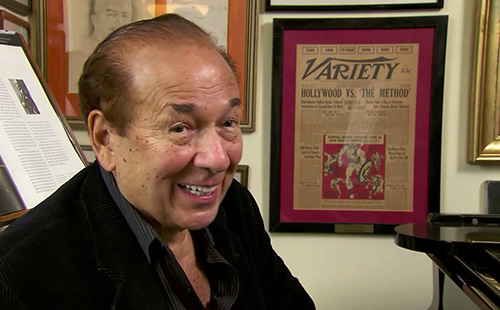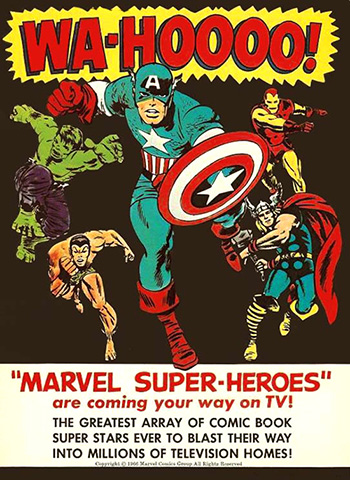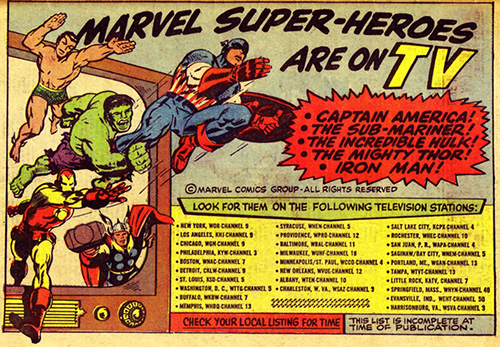

  |
|
|
||||||||||||||||||||||
|
FMS FEATURE... July 14, 2015 The Marvel Super Heroes Songs: The Inside Story Jack Urbont's toon classics still resonate with boomers today by Jon Burlingame  But back in the 1960s, when Marvel heroes like The Fantastic Four, The Amazing Spider-Man and The X-Men were just beginning to gain pop-culture traction, an enterprising outfit called Grantray-Lawrence Animation turned five Marvel heroes into a cartoon series that enjoyed syndication success for a year or two. Marvel Super Heroes debuted in the fall of 1966: Sixty-five half-hour episodes devoted to the adventures of Captain America, the Incredible Hulk, the Mighty Thor, Iron Man and the Sub-Mariner. The shows, while cheaply animated, were distinguished by their art – from the original drawings of such giants as Jack Kirby, Don Heck and Steve Ditko – and the scripts, which were doctored by Marvel's own chief writer, Stan Lee. The series has largely disappeared. But their theme songs are among the best-remembered cartoon tunes of the 1960s. Remember these lines? "When Captain America throws his mighty shield, all those who chose to oppose his shield must yield...." "Doc Bruce Banner, belted by gamma rays, turns into the Hulk, ain't he unglamoraze?" "Across the rainbow bridge of Asgard, where the booming heavens roar, you'll behold in breathless wonder, the God of Thunder, Mighty Thor!" "Tony Stark makes you feel, he's a cool exec with a heart of steel / As Iron Man, all jets a-blaze, he's fightin' and smitin' with repulsor rays!" "Stronger than a whale, he can swim anywhere, he can breathe underwater and go flying through the air, the noble Sub-Mariner, prince of the deep..." All were the work of New York songwriter Jack Urbont, whose resume includes soap-opera themes and scores (General Hospital, One Life to Live), successful off-Broadway musicals (All in Love), Emmy-winning nature series (Lorne Greene's New Wilderness) and dramatic underscores for prime-time series (Mission: Impossible).  Urbont was perfect for the job. A former child actor, he had done voices for Little Lulu and Popeye cartoons; he had been writing songs for Shari Lewis' children's show; and he was as adept at memorable melodies as he was clever with a turn of phrase. But he stunned Lee by admitting complete ignorance of the comic-book world of heroes and villains. Urbont recalled his response: "Mr. Lee, I know what you're thinking, and if I were in your shoes, I'd be thinking the same thing. But just get me some source material – one or two comic books – and three days later, I will have songs that are so terrific you will wish you'd written them yourself." Urbont walked out of the meeting with sample comics for the five heroes that Grantray-Lawrence planned to animate. A few days later, he returned to "demo" the songs for Lee and the producers, and received the OK to proceed further. Ultimately, Urbont would deliver seven songs: one each for the heroes, plus an overall title theme ("The Marvel Super-Heroes Have Arrived") and one for the Merry Marvel Marching Society, the Marvel fan club. With a promise of $3,000 for the songs, Urbont traveled to Munich, Germany, then a popular destination for recording orchestra backgrounds for low-budget films and TV. At his own expense, he organized and produced the sessions (his conductor, Sam Spence, who would go on to later fame writing rousing backgrounds for NFL Films). The orchestra consisted of "over 40" musicians, he recalls. He then flew to Toronto to produce and record the vocal tracks with about 10 singers. In just 18 to 19 seconds, Urbont managed to capture the essence of each super-hero: An upbeat march with a patriotic feel for Captain America; a majestic, dramatic tone for Thor; a sense of humor for the "monster clown" Hulk; a watery, harp-dominated intro for the oceangoing Sub-Mariner; and a Sinatra-style vocal for the flashy, womanizing Tony Stark, Iron Man's alter ego. "The Marvel Super-Heroes Have Arrived," his one-minute intro to the entire quintet, is less well-known, although it can be heard in a recent PBS documentary (Superheroes: A Never-Ending Battle). Here Urbont was able to expand on his character descriptions ("sulky, overbulky, kinda Hulky superhero... a two-fisted and electrically transistored superhero... a hum-dingin', real swingin', shield-slingin' superhero"). "The Merry Marvel Marching Society" was issued on a now-rare and highly collectible 45 rpm record sent to MMMS members. In terms of the cartoons themselves, each comic-book adventure was condensed into three six-and-a-half-minute cartoons which, bundled together, would fill a half-hour timeslot; or they could play individually as daily cliffhangers incorporated into a station's existing afternoon kids' programming. (Urbont did not compose the dramatic underscores for the episodes; those were drawn from generic dramatic music in the Emil Ascher production-music library, the same one used in the cult classic Plan 9 From Outer Space.)  For the past few years, he has pursued a lawsuit involving rapper Ghostface Killah, who used the original "Iron Man" theme for a 2000 recording without authorization. That case is still in the courts. Yet, nearly 50 years later, Urbont remains proud of his work on all the Marvel songs. Stan Lee himself was an admirer. In an interview published in 2004, Lee said, "I wish I could claim to have written the lyrics, because I think they're brilliant, but alas, I didn't." Adds Urbont: "From this tiny little show that lasted only a year in syndication, for an outfit that went bankrupt a year later, this thing has grown exponentially," he says. "It's now part of the fabric of American culture." Here is Urbont singing six of the original seven Marvel songs: ©2015 Jon Burlingame |
Search
Past Features
|